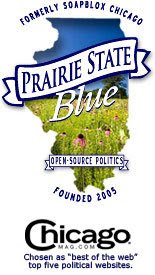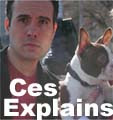From Charles Madigan, Trib senior writer and blogger-scold, in your March 1, 2006, Chicago Tribune:
From your October 17, 2004, Chicago Tribune:People who pick up questionable things and present them as real are info-pimps.
I just invented that word. I like the sound of it.
It conjures images of parasites, laptops in place, typing up a storm and then putting it out on the street, where the gullible, thinking it's the real deal, just gobble it up. ***
The Tribune is an info-pimp free zone, from its snappy bloggers to boring old me.
So, you best believe it's mainstream media and thank your lucky stars that it's here because without it, you can't imagine the kinds of folks you would be hanging out with.
[F]or his resoluteness on the defining challenge of our age -- a resoluteness John Kerry has not been able to demonstrate -- the Chicago Tribune urges the re-election of George W. Bush as president of the United States. ***info-pimps (ĭn'fō pĭmp) n., People who pick up questionable things and present them as real.Kerry displays great faith in diplomacy as the way to solve virtually all problems. Diplomatic solutions should always be the goal. Yet that principle would be more compelling if the world had a better record of confronting true crises, whether proffered by the nuclear-crazed ayatollahs of Iran, the dark eccentrics of North Korea, the genocidal murderers of villagers in Sudan -- or the Butcher of Baghdad.
In each of these cases, Bush has pursued multilateral strategies. In Iraq, when the UN refused to enforce its 17th stern resolution--the more we learn about the UN's corrupt Oil-for-Food program, the more it's clear the fix was in -- Bush acted. He thus reminded many of the world's governments why they dislike conservative and stubborn U.S. presidents (see Reagan, Ronald).
Bush has scored a great success in Afghanistan -- not only by ousting the Taliban regime and nurturing a new democracy, but also by ignoring the chronic doubters who said a war there would be a quagmire. He and his administration provoked Libya to surrender its weapons program, turned Pakistan into an ally against terrorists (something Bill Clinton's diplomats couldn't do) and helped shut down A.Q. Khan, the world's most menacing rogue nuclear proliferator.
Many of these cross-currents in Bush's and Kerry's worldviews collide in Iraq.
Bush arguably invaded with too few allies and not enough troops. He will go to his tomb defending his reliance on intelligence from agencies around the globe that turned out to be wrong. And he has refused to admit any errors.
Kerry, though, has lost his way. The now-professed anti-war candidate says he still would vote to authorize the war he didn't vote to finance. He used the presidential debates to telegraph a policy of withdrawal. His Iraq plan essentially is Bush's plan. All of which perplexes many. ***John Kerry has been a discerning critic of where Bush has erred. But Kerry's message -- a more restrained assault on global threats, earnest comfort with the international community's noble inaction -- suggests what many voters sense: After 20 years in the Senate, the moral certitude Kerry once displayed has evaporated. There is no landmark Kennedy-Kerry Education Act, no Kerry-Frist Health Bill. Today's Kerry is more about plans and process than solutions. He is better suited to analysis than to action. He has not delivered a compelling blueprint for change.
For three years, Bush has kept Americans, and their government, focused -- effectively -- on this nation's security. The experience, dating from Sept. 11, 2001, has readied him for the next four years, a period that could prove as pivotal in this nation's history as were the four years of World War II.
That demonstrated ability, and that crucible of experience, argue for the re-election of President George W. Bush. He has the steadfastness, and the strength, to execute the one mission no American generation has ever failed.
That is a handy word, Mr. Madigan.
A very handy word.


































